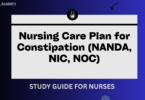Macular degeneration is a leading cause of vision loss in older adults. It affects 11 million people in the United States alone. This condition can greatly reduce a person’s quality of life and independence. But, with a good nursing care plan, healthcare professionals can help patients keep their vision.
Key Takeaways
- Macular degeneration affects 11 million Americans, underscoring the critical need for effective nursing care plans.
- A personalized nursing care plan is essential in managing the physical, emotional, and lifestyle impacts of macular degeneration.
- Comprehensive assessment, medication management, and interdisciplinary collaboration are key components of a successful nursing care plan.
- Patient and caregiver education, as well as the incorporation of assistive devices, can significantly improve outcomes and quality of life.
- Implementing tailored coping strategies and connecting patients to community resources are vital in supporting individuals living with macular degeneration.
Understanding Macular Degeneration
Macular degeneration is a common eye condition that affects the macula. This is the central part of the retina that helps us see clearly. It can take two main forms: dry and wet macular degeneration. Knowing about these types and causes is key to catching it early and managing it well.
Types and Causes of Macular Degeneration
Dry macular degeneration is the more common type. It happens when the macula breaks down and gets thinner over time. This can slowly make central vision worse.
Wet macular degeneration is less common but more severe. It happens when new, abnormal blood vessels grow under the macula. These vessels can leak fluid, causing sudden and severe vision loss.
Risk Factors and Early Symptoms
Getting older is the biggest risk factor for macular degeneration. It gets more common with age. Other risks include smoking, high blood pressure, and too much sun exposure. If you have a family history of it, you’re also at higher risk.
Early signs of macular degeneration include blurry or distorted vision. You might have trouble recognizing faces or see dark spots in your vision. Knowing these signs can help you watch your eye health closely and get medical help early.
Understanding macular degeneration helps you take steps to protect your eyes. This way, you can catch any problems early and get the right treatment.
Nursing Assessment for Macular Degeneration
Doing a detailed nursing assessment is key for a good care plan for patients with macular degeneration. This process looks at how well the patient sees, their daily skills, and health issues that might make things worse.
The comprehensive eye exam is a big part of this assessment. It checks the patient’s vision in several ways, including:
- Visual acuity: How clear and sharp things look at different distances
- Contrast sensitivity: How well the patient can tell different levels of light and dark apart
- Color vision: How well the patient sees colors
- Pupillary function: How the pupils react to light
But it’s not just about the eyes. The assessment also looks at how well the patient can do everyday tasks, read, drive, and other things that need good vision. This helps see how macular degeneration affects their life and what help they might need.
Also, the assessment looks for health issues that could make macular degeneration worse, like heart disease, diabetes, or high blood pressure. By dealing with these issues, the healthcare team can make a better care plan for the patient.
| Key Elements of Nursing Assessment for Macular Degeneration | Purpose |
| Comprehensive eye examination | Evaluate visual acuity, contrast sensitivity, color vision, and pupillary function |
| Functional ability assessment | Determine the impact of macular degeneration on daily activities and identify areas for intervention |
| Identification of underlying health conditions | Address any contributing factors that may exacerbate the macular degeneration |
With a careful nursing assessment, healthcare workers can make a tailored care plan for patients with macular degeneration. This plan meets their physical, emotional, and daily needs.
Developing a Personalized Care Plan
Caring for people with macular degeneration means tailoring care to their unique needs. This approach helps manage the challenges of this eye condition. It also supports their overall well-being.
Addressing Physical Needs
The care plan focuses on the physical effects of macular degeneration. It aims to improve vision, keep people independent, and prevent vision loss. Nursing interventions include:
- Providing assistive devices, such as magnifiers, large-print reading materials, and specialized lighting, to enhance visual function
- Working with occupational therapists to make living spaces safer and more accessible
- Creating a plan to manage conditions like diabetes or hypertension that can worsen macular degeneration
Promoting Mental Well-being
The care plan also focuses on mental health and emotional support. Macular degeneration can affect a person’s mental well-being, causing feelings of isolation, depression, and anxiety. Nursing interventions to support mental health include:
- Offering counseling and support services for patients and caregivers
- Connecting patients with support groups, both in-person and online, to reduce isolation
- Working with mental health experts to manage stress, anxiety, and depression
By addressing both physical and mental health, the personalized care plan helps people with macular degeneration maintain their quality of life. It helps them adapt to the changes caused by this eye condition.
Medication Management
Managing medications is key for caring for macular degeneration patients. They might need treatments like anti-VEGF injections, photodynamic therapy, and low-vision aids. It’s important to watch and give these treatments right to help control symptoms and slow the disease.
Monitoring and Administering Prescribed Treatments
It’s crucial to watch how a patient reacts to treatment. Nurses should keep an eye on the patient’s vision, eye health, and any side effects from meds. This helps check if the treatment is working and adjust it if needed.
Getting medications right is also key. Nurses need to know how to give anti-VEGF injections and photodynamic therapy correctly. They should also teach patients how to use low-vision aids well.
| Treatment Option | Description | Key Considerations for Nurses |
| Anti-VEGF Injections | Injections that block the growth of abnormal blood vessels in the eye, preventing further vision loss. |
|
| Photodynamic Therapy | A treatment that uses a light-activated drug to selectively destroy abnormal blood vessels in the eye. |
|
| Low-Vision Aids | Devices that help patients with macular degeneration maximize their remaining vision, such as magnifiers, telescopes, and lighting adjustments. |
|
Nurses are crucial in managing macular degeneration. They monitor patient responses, give treatments right, and teach patients about their meds and devices. This helps manage the condition effectively.
Nursing care plan for macular degeneration
Caring for people with macular degeneration needs a detailed nursing care plan. Nurses are key in keeping eyesight good, making sure patients are safe, and helping them with daily tasks. This condition slowly affects vision, but nurses can help manage it.
The care plan for macular degeneration includes several important steps:
- Visual Function Preservation: Nurses help patients keep their vision as good as it can be. They provide aids for low vision, teach new ways to do things, and work with eye doctors to track the disease.
- Safety Promotion: Nurses check the patient’s living space and suggest ways to make it safer. They help by improving the lighting, removing dangers, and giving out tools like canes or walkers.
- Daily Living Support: Nurses teach patients how to do everyday tasks even with less vision. This includes cooking, getting ready, and taking medicines.
- Interdisciplinary Coordination: Nurses work with the patient’s healthcare team. This includes eye doctors, occupational therapists, and social workers. They make sure all parts of the patient’s health are looked after.
With a detailed care plan, nurses can greatly help people with macular degeneration. They help patients stay independent, live better, and deal with the challenges of this condition.
| Nursing Intervention | Description |
| Visual Function Preservation | Strategies to maintain and optimize remaining visual acuity, including providing low-vision aids and educating on adaptive techniques. |
| Safety Promotion | Assessing the home environment and making recommendations to enhance safety, such as improving lighting and reducing tripping hazards. |
| Daily Living Support | Teaching patients techniques for performing daily tasks, such as meal preparation, personal grooming, and managing medications. |
| Interdisciplinary Coordination | Collaborating with the patient’s healthcare team to ensure a holistic approach to managing macular degeneration. |
Lifestyle Modifications and Support
People with macular degeneration can improve their life by making lifestyle changes and getting support. Important steps include following dietary advice and using visual aids and devices.
Dietary Recommendations for Macular Degeneration
Eating a diet full of nutrients is key to managing macular degeneration. Experts suggest eating more antioxidants and omega-3 fatty acids. These help slow down the disease and keep vision sharp.
Great foods for these nutrients are leafy greens, citrus fruits, fatty fish, and nuts. Adding these to your meals can make a big difference.
Visual Aids and Assistive Devices
As macular degeneration gets worse, everyday tasks can become harder. Using visual aids and devices can help. They make it easier to do daily activities.
These tools include magnifiers, large-print books, special lighting, and software that makes computer screens bigger or clearer. Using these can boost independence and daily life.
By making these changes and using these tools, people with macular degeneration can manage their condition better. They can keep their quality of life and vision as good as possible.
Collaborating with Interdisciplinary Teams
Managing macular degeneration needs a team of healthcare experts working together. This team makes sure patients get full care for their eye condition. They look at all parts of the disease.
The team for caring for macular degeneration includes:
- Ophthalmologists – They diagnose, treat, and manage eye diseases, including macular degeneration.
- Optometrists – They check how well you see, give out glasses, and help with low-vision tools.
- Nurses – They teach patients, manage medicines, and plan the care.
- Occupational Therapists – They help patients adjust to everyday tasks and use tools to help them.
- Low-Vision Specialists – They offer special tools and training to improve life quality.
Working together, this team shares information, makes joint decisions, and treats and rehabilitates patients as a team. This way, they make sure patients’ physical, emotional, and functional needs are met. It helps patients live better and see better too.
| Healthcare Professional | Role in Macular Degeneration Care |
| Ophthalmologist | Diagnose, treat, and manage macular degeneration and related eye conditions |
| Optometrist | Assess visual acuity, prescribe corrective lenses, and provide low-vision aids |
| Nurse | Provide patient education, medication management, and coordinate the care plan |
| Occupational Therapist | Assist patients in adapting to daily activities and using assistive devices |
| Low-Vision Specialist | Provide specialized visual aids and training to improve quality of life |
Educating Patients and Caregivers
Teaching patients with macular degeneration is key in nursing care plans. Nurses give them and their caregivers the right info. This helps them take charge of their care and handle the condition better.
Nurses should teach patients and caregivers about macular degeneration by covering these main points:
- Understanding the condition, including the different types and causes of macular degeneration
- Recognizing the early symptoms and risk factors associated with the disease
- Exploring the available treatment options and their potential benefits and side effects
- Learning about self-management strategies, such as dietary modifications and the use of visual aids
- Identifying community resources and support services that can assist with daily living and emotional well-being
This knowledge helps patients and caregivers make smart choices, cope better, and keep a good quality of life with macular degeneration.
Nurses should also make sure there’s open talk and ongoing support. This helps patients and caregivers feel in control. It also makes managing the condition better.
With strong patient education for macular degeneration and caregiver education for macular degeneration, nurses are key. They help people and their families deal with this chronic eye issue. This improves their well-being and life quality.
Coping Strategies and Community Resources
Living with macular degeneration is tough, both physically and emotionally. Luckily, there are many ways to get help and support. Joining a support group can make you feel part of a community. You’ll find people who understand what you’re going through and can offer advice.
Getting help from a counselor can also be very helpful. They can guide you and your loved ones through the tough feelings that come with this condition. Counselors can help with stress, anxiety, and depression, which are common.
There are also many resources in the community for people with macular degeneration. Places like low-vision clinics, occupational therapy services, and assistive technology centers can help. They offer tools, training, and support to make life easier for patients and their caregivers.
FAQ
What is macular degeneration?
Macular degeneration is a condition that affects the macula, the central part of the retina. It’s responsible for sharp vision. This condition can lead to vision loss and is the top cause of blindness in older adults.
What are the types of macular degeneration?
There are two main types: dry (atrophic) and wet (exudative). Dry is the more common type and involves the slow breakdown of the macula. Wet type is when abnormal blood vessels grow and leak, causing quick vision loss.
What are the risk factors for macular degeneration?
Risk factors include age, family history, smoking, high blood pressure, high cholesterol, and too much sun exposure. Genetic factors and lifestyle choices also increase the risk.
How do nurses assess patients with macular degeneration?
Nurses assess patients by doing a detailed eye check-up. They look at how well you can see, your daily abilities, and any health issues that might affect your vision.
What are the key components of a nursing care plan for macular degeneration?
The care plan focuses on your physical and mental health. It includes keeping your vision as good as possible, making sure you’re safe, helping with daily tasks, managing your meds, and offering support and counseling.
How do nurses manage medications for patients with macular degeneration?
Nurses make sure you’re getting the right treatment for macular degeneration. They watch how you react to treatments like injections and manage any side effects. They also make sure you’re taking your meds correctly.
What lifestyle modifications can help manage macular degeneration?
Making some changes in your life can really help. Nurses suggest eating foods with antioxidants and omega-3 fatty acids. They also recommend using visual aids and devices to help you see better and stay independent.
How do nurses collaborate with interdisciplinary teams in macular degeneration care?
Managing macular degeneration means working together as a team. Nurses work with eye doctors, therapists, and specialists to give you the best care. This team approach covers all your health needs.
What are the key elements of patient and caregiver education for macular degeneration?
Teaching is a big part of caring for macular degeneration. Nurses share important info about the condition, treatment options, and ways to manage it. They also help find resources to support you and your caregivers.
What coping strategies and community resources are available for individuals with macular degeneration?
Dealing with macular degeneration can be tough. Nurses help you find ways to cope, like support groups and counseling. They also connect you with community resources to help you live well with this condition.










